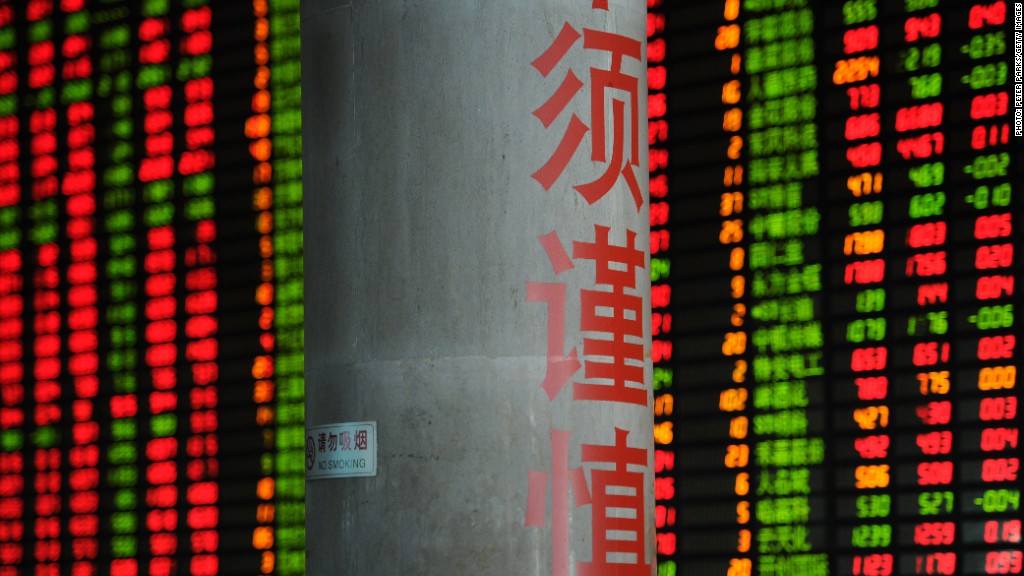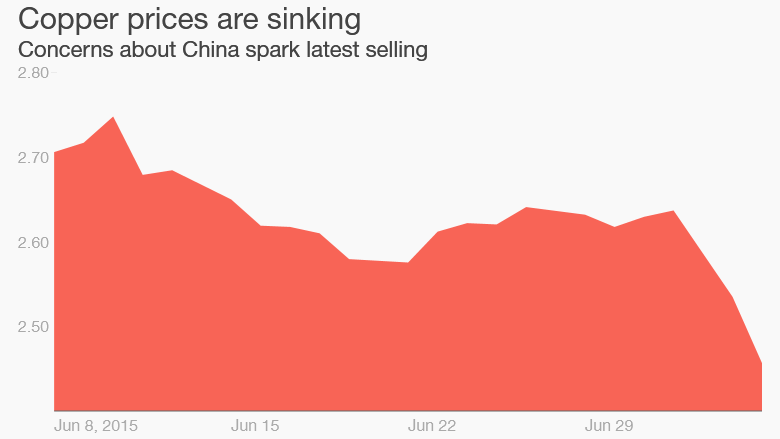
The crumbling Chinese stock market is crashing into the global metals market.
Copper plummeted to six-year lows and gold took its biggest hit in nearly two months on Tuesday as alarms continue to sound about China's health.
At first glance, it may not make sense for trouble in China to impact precious and industrial metals. But it's important to remember how turbulence in one asset class can cause trouble in another.
Chaos has gripped Chinese stocks in recent weeks, sending the previously red-hot market nose diving 25%. The ferocious selling has forced investors who bought stocks with borrowed money to pay back loans by dumping other assets -- including gold and other commodities.
"When there is panic in the market, people need to liquidate whatever they can liquidate. You can have these spillover effects," said Axel Merk, president and chief investment officer of Merk Investments.
Related: Bargain hunting in the Chinese stock rubble
The panic may have been deepened by the fact that trading has now been halted in nearly 25% of Chinese stocks. That means investors who own those stocks can't exit even if they want to.
"If you have the Chinese regulators step in and close the doors when someone screams fire, that can cause havoc in the markets," said Merk.
It's also possible that stockpiles of metals like copper and iron ore have been pledged as collateral against plunging Chinese stocks, Michael Block, chief market strategist at Rhino Trading, told clients in a note.
"If so, we could see a real meltdown in commodities," Block wrote.
Related: Foreign investors can't ignore China's crazy stock market
Economic fears rise: At the same time, investors are getting concerned that China's plunging stock market may be a sign of underlying troubles in the world's second-largest economy. Financial markets often act as the canary in the coal mine, revealing signs of a deeper slowdown in the economy before official statistics do.
"There are worries that the Chinese equities market is not just behaving badly because of mere speculative excess being worked off but indicating problems inside the economy," said Mark Luschini, chief investment strategist at Janney Montgomery Scott.
A severe economic slowdown in China would be bad news for the rest of the world. China has been an engine of global growth and it's displayed an insatiable appetite for commodities. No wonder resource-rich Australia a past beneficiary of China's hunger is now scrambling to avoid its first recession in 24 years.
Related: Nearly 25% of Chinese stocks have stopped trading
Copper dives to six-year lows: These growth concerns are weighing heavily on copper, one of the most economically sensitive metals. Copper declined nearly 4% on Tuesday to $2.45 per pound, its weakest level since July 2009. Keep in mind that period six years ago was just as the world was emerging from the last recession.
Gold fell 1.5% to $1,155 a troy ounce, a level unseen since March, while silver plunged almost 5%.
The metals selling has also slammed mining companies. Shares of Silver Wheaton (SLW) plummeted 12% on Tuesday, while Coeur Mining (CDE) and Hecla Mining (HL) tumbled about 8% a piece.

Related: IMF warns U.S.: Your financial system is (still) vulnerable
Greece not causing panic: Of course, China doesn't deserve sole blame for the recent downturn in commodities. They've also been hurt by the U.S. dollar, which has rallied this week as investors back away from the euro amid the crisis in Greece. A stronger greenback makes commodities priced in dollars more expensive for overseas buyers.
Gold bugs must be frustrated that the yellow metal has thus far been unable to capitalize on the financial chaos in Greece. Normally gold rises during times of global fear as it's looked at as an insurance policy against disaster.
But the muted reaction in the gold market may be another sign that investors believe the trouble in Greece will largely stay there and avoid infecting the rest of the world.





